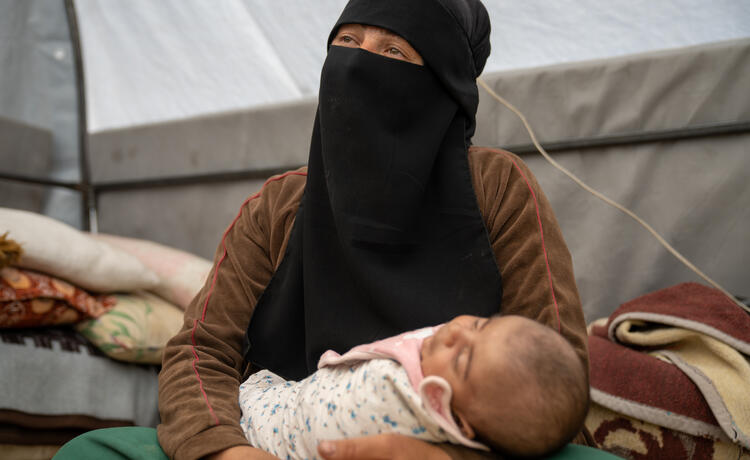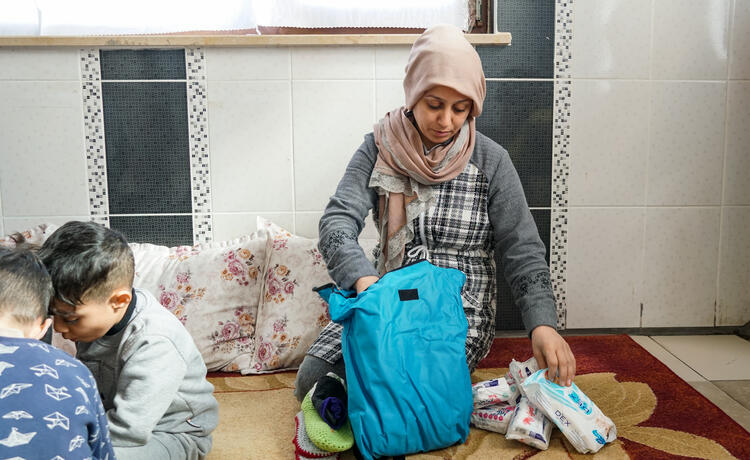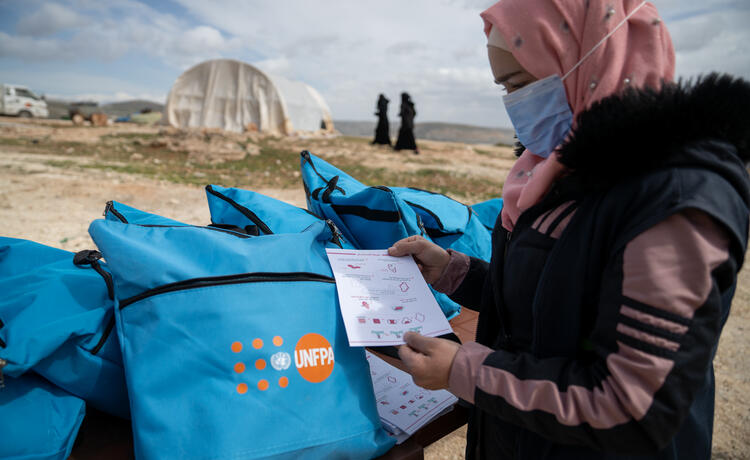News
3 months on from the earthquakes, 5 reasons women and girls in Syria and Türkiye still need your support
- 05 May 2023
News
Updated to reflect new data as of 4 May 2023
SYRIA/TÜRKIYE – “I feel very broken. I’m trying to hold on for the sake of my children, because they are extremely exhausted after the earthquake – I don’t want anything to disturb them anymore.”
Three months on from the worst natural disaster the region has seen in recent memory, 42-year-old Ghada* is still living in a shelter with her three children in Lattakia, Syria. The earthquakes on 6 February 2023 upended the lives of nearly 9 million people in Türkiye and 8.8 million in Syria. Among them were some 270,000 pregnant women – women who no longer had hospitals to give birth in; women who still, months later, need vital access to health services in structures that remain too dangerous to use, through rubble that used to be roads.
In Syria, the earthquakes only deepened the entrenched suffering from 12 years of conflict that had left 90 per cent of Syrians destitute and forced half the population from their homes, most of them women and children – many taking refuge in Türkiye.
In Türkiye, a country home to the largest number of refugees in the world, tens of thousands of people were forced into makeshift shelters on the street, their family homes flattened in an instant – some 2.4 million are reported to be still living in displacement camps.
In a humanitarian crisis, women and girls are still, always, the hardest hit. The last to eat, the most exposed to sexual violence and exploitation, the heads of houses they no longer hold.
No emergency response should be gender blind: Women and girls have to be put first.
Here’s why.
1. Crises can mean life or death for pregnant women
Hundreds of hospitals and health centres, including UNFPA-supported facilities and safe spaces, collapsed or were severely damaged. This left pregnant women and new mothers struggling to access essential care, including emergency obstetric support and Caesarean sections.
Um Subhi and her newborn received maternal support from UNFPA in Syria, at a temporary camp in Jinderis. “When the earthquake hit I was breastfeeding my baby, I didn't know what happened. I've never experienced anything like this in my entire life,” she said.

We know that in crisis and disaster settings, maternal deaths can rise dramatically from complications that would be easily managed in settings where health systems were functioning.
When the quakes hit there were an estimated 140,000 pregnant women in Syria, around 15,000 of whom were due to give birth in the next month: In the ruins of the region’s worst natural disaster in recent history, they had to rely on a health system bludgeoned by over a decade of bombardments, economic chaos and near total lack of supplies or staff.
In Türkiye, more than 14,000 of the 130,000 pregnant women directly affected by the earthquakes delivered within a month of the crisis striking. Nearly the entire health infrastructure in the four most affected provinces was damaged or destroyed – 70 per cent of family health centres were damaged and 60 per cent of maternal health and obstetric services not operating, endangering tens of thousands of lives.
2. Disrupted sexual and reproductive health access could trigger a secondary disaster
The sudden lack of health care from the disaster endangered the immediate and longer-term health of some 2.2 million women and girls of reproductive age in Syria and 2.4 million in Türkiye, all of whom needed the sexual and reproductive health care of their choice: Without contraceptive supplies or access to them, unintended pregnancies spike, as could sexually transmitted infections, including HIV. Other diseases are more easily spread too, such as COVID-19 and influenza and pre-existing outbreaks of cholera, hepatitis A and measles in Syria.
We must ensure access to reproductive health care for all women and girls who need it, regardless of where they may be, including in temporary shelters and within host communities in both Syria and Türkiye.
3. Gender-based violence protection needs soar in a crisis
Women and girls are also at much greater risk of violence and abuse in disaster settings, just as social security and protection services break down and health facilities collapse. Yasmin*, 26, is a single mother of five children. Originally from Deir-ez-zor in eastern Syria, she has lived in Türkiye for five years and took shelter at a UNFPA safe space for women and girls set up in a sports hall after the earthquakes.
Her husband was physically and emotionally abusive towards her. “He threatened me, he wanted to take my children away.” UNFPA previously provided shelter in a safe space, and with her home severely damaged she had been moved to the shelter.
UNFPA safe spaces in Syria and Türkiye ensured prevention and response services for gender-based violence for tens of thousands of women and girls living in over-crowded, makeshift camps or on the streets. Many are still facing acute protection risks, including gender-based violence, exploitation and abuse, and violations such as child and forced marriage – all of which have also become increasingly ‘normalized’ during Syria’s protracted crisis.
Millions of women and girls, in Syria in particular, are finding it nearly impossible to recover and rebuild their lives, enduring terrible trauma and need access to mental health and psychosocial support.
4. Displacement takes a severe physical, mental and social toll
Hundreds of thousands of people were displaced by the earthquakes: Many remain stranded, others returned to unsafe, uninhabitable homes and many more endure life on the streets or in refuges, unable to rebuild their houses or livelihoods.
Before the earthquakes, Syria already had the largest number of internally displaced people in the world at 6.8 million, with the same number having fled for neighbouring countries. People forced from their homes by war, disease outbreaks and financial ruin were later met with droughts and floods that destroyed what remained of their livelihoods. With this latest disaster, millions more had to battle the trauma of involuntary migration once again.

Almost half of them are women and girls, grappling with homelessness, discrimination, poverty and escalating risks of exploitation and abuse. Rojin is a 36-year-old mother of four, who took shelter in a UNFPA safe space for women and girls in Diyarbakır, in Türkiye. Originally from Syria, she and her family bedded down alongside 15 others in a single room of a former factory. She told UNFPA, “We stayed outside in a park for four days. We couldn’t take anything. Nothing, nothing for the children, no shoes… the situation is very difficult.”
To help survivors deal with the immediate upheaval, UNFPA is assuring psychosocial support and has set up hotlines for emergency help. Dignity and reproductive health kits are also being provided, containing essentials such as soap, underwear, menstrual hygiene products, laundry detergent and warm clothing.
5. Solidarity and financial support must be sustained
UNFPA was on the ground from day one, coordinating with partners to reestablish sexual and reproductive health and protection services in Syria and Türkiye. But funding is still urgently needed for more clinics, mobile health teams and safe spaces. Additional staff, equipment and supplies, including life-saving maternal health medicine, contraceptives and menstrual hygiene products, have not been fully restocked, which could endanger millions of lives.
Since the onset of the crisis, with the generous support of our partners and contributions from Australia, the Central Emergency Response Fund (CERF), Ireland, New Zealand, Norway, Sweden, the United Kingdom and the United States, UNFPA has ramped up its facilities and mobile health teams to reach vulnerable and displaced people with essential services.

UNFPA has been coordinating with partners since day one to get reproductive health and protection supplies delivered and services up and running again, increasing mobile teams and outreach to reach nearly 500,000 women and girls in need.
Yet millions are not receiving the necessary support: In Türkiye, UNFPA is appealing for $19.7 million to scale up the delivery of reproductive health and protection services. To date, the appeal is not even 50 per cent funded. In Syria, UNFPA is appealing for $24.8 million, of which we have received only a third. And we cannot forget that the earthquakes exacerbated the pre-existing crisis in Syria, for which UNFPA is also appealing for $141.2 million.
As Ghada* told UNFPA, “I want to enter my home and close the door, so that I feel safe. I just want a safe space for my family.” We urge a show of solidarity to ensure the women and girls of Syria and Türkiye receive the protection and sexual and reproductive health support they deserve, without further delay.
*Name changed for privacy and protection